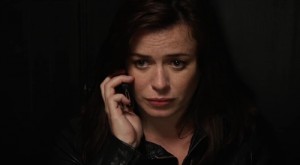Showrunner Russell T Davies and writer Jane Espenson have come in for quite a bit of criticism for this series and virtually all  of it is warranted, in our opinion. Whether it was far too many scenes – and even entire episodes – that turned out to be nothing but filler; characters acting either out of character or acting in a way that no human being would act; cynical ideas about the nature of people that don’t correspond to any real world experience; getting big and loud at times when the story called for subtlety and nuance, or attempting subtlety at points when the audience probably needed an explosion or two; you can look back on this series (assuming you’d want to) and practically write a book about what happens when creators clearly don’t have a lot of respect for the audience. But with all that – and it’s all true – we feel they should at least be complimented for devising an entirely new and exciting literary tool. Forget Russell’s tendency to employ deus ex machina endings; we should all be congratulating him for devising the brand new and exciting deus ex vagina ending.
of it is warranted, in our opinion. Whether it was far too many scenes – and even entire episodes – that turned out to be nothing but filler; characters acting either out of character or acting in a way that no human being would act; cynical ideas about the nature of people that don’t correspond to any real world experience; getting big and loud at times when the story called for subtlety and nuance, or attempting subtlety at points when the audience probably needed an explosion or two; you can look back on this series (assuming you’d want to) and practically write a book about what happens when creators clearly don’t have a lot of respect for the audience. But with all that – and it’s all true – we feel they should at least be complimented for devising an entirely new and exciting literary tool. Forget Russell’s tendency to employ deus ex machina endings; we should all be congratulating him for devising the brand new and exciting deus ex vagina ending.
Ugh. We can’t with this show anymore. Good thing we won’t have to.
What a shame that John Barrowman and Eve Myles did their best work ever with these characters. It was wasted in such a shitty story and in all likelihood, due to the critical drubbing this show received and the less-than stellar ratings, we’re not likely to see a new season of Torchwood any time soon. We suppose we should be at least partially thankful for that because we’re not particularly interested in a world where Rex Matheson can’t die.
Can you believe that ending? We saw it coming as soon as Esther mentioned the transfusion, but even then we rolled our eyes so hard we think it may have been audible. Davies and Espenson seemed determined to kill off the most likeable new characters (Vera and Esther) and they seem weirdly in love with the least likeable character of all; Rex. This goes back to the sort of childish, teen-angst version of cynicism that sometimes characterizes Davies’ work. The worst episodes of the early seasons of Torchwood were awash in that kind of darkness and when ridiculously pointless character Oswald Danes went out with a cry to his victim that he was going to spend all of eternity raping her, we felt like we were watching a first-year film student’s first  attempt at screenwriting.
attempt at screenwriting.
In fact, looking back on this whole series, it feels like they wrote a first draft of a story and just shot it for the cameras. Did we need to spend so much time on Phicorp? What exactly was the point in making Oswald into a messianic figure? How did that serve The Families? And why did they suddenly drop him? What happened to those cults that were springing up? Let’s see… what else…? Oh. Right.
WHAT THE FUCK WAS THE BLESSING AND HOW THE FUCK DID IT WORK?
Talk about insulting your audience. “Oh that big thing that the entire story hinges on? We’re not gonna explain it. Aren’t we clever? Look! Tea Party! Healthcare crisis! Corporate control of government! Aren’t you dazzled by our scathing critique of American culture?”
There’s been some talk amongst the Who-vians about how this entire story seems to deviate from the Whoniverse from which it sprang. We’re more than happy to pretend that this all happened on a parallel earth somewhere and there will be a season 5 of Torchwood set in Wales, where none of this ever happened and Gwen and Jack recruit a bunch of plucky Brits (instead of American stereotypes) to make up the new Torchwood team. Let’s all wish real hard to make this happen. Davies is fine (problematic but fine) working on his home soil, writing the kinds of characters he knows well. Unfortunately, the likelihood of that seems very slim, which is a shame, because they’ve done fantastic work with the character of Gwen and even managed to get us to compliment Barrowman’s acting, which we never expected.
The episode had its moments: Geraint’s death scene was tear-jerking, the tension was really high all throughout the episode, we  got a slight beatdown on Jilly (but not enough of one; we could have watched Gwen punching her for another 40 minutes), and Esther got some great moments showing how far she’s come from the wimpy, unsure analyst she was at the beginning of the story. But it struck us after Rex killed that guy in Buenos Aires (by throwing him into a vagina) that the villains of the piece were, for the most part, completely unknown to us. Who was that guy in Buenos Aires? Who was the lady in Shanghai? Were their names even mentioned? The entire ten hours led to a showdown with two practically unknown villains, with hazy motives, and a phenomenon that went largely unexplained. How did The Blessing make everyone immortal with Jack’s blood when there’s nothing special about Jack’s blood; something that’s not only part of past continuity but was mentioned several times in the story. And if the world became immortal from Jack’s blood, why was it different from the kind of immortality Jack actually has, where he heals from wounds almost instantaneously?
got a slight beatdown on Jilly (but not enough of one; we could have watched Gwen punching her for another 40 minutes), and Esther got some great moments showing how far she’s come from the wimpy, unsure analyst she was at the beginning of the story. But it struck us after Rex killed that guy in Buenos Aires (by throwing him into a vagina) that the villains of the piece were, for the most part, completely unknown to us. Who was that guy in Buenos Aires? Who was the lady in Shanghai? Were their names even mentioned? The entire ten hours led to a showdown with two practically unknown villains, with hazy motives, and a phenomenon that went largely unexplained. How did The Blessing make everyone immortal with Jack’s blood when there’s nothing special about Jack’s blood; something that’s not only part of past continuity but was mentioned several times in the story. And if the world became immortal from Jack’s blood, why was it different from the kind of immortality Jack actually has, where he heals from wounds almost instantaneously?
But we think the most laughable part (apart from the “I’m coming to get you, Suzie!” death speech from Oswald) was how we were supposed to believe that the world just went back to normal after this was all over. Esther’s sister is magically cured of her madness and reunited with her children, and apparently the ovens, and the terrifying government overreach and the abolishing of drug prescriptions (Did that ever go anywhere?) have all been resolved because Torchwood blew up Mother Earth’s vagina.
Actually, no; the truly laughable part was how they left several plot points dangling in the expectation that there will be a new season to explore them and an audience willing to watch it. That’s hilarious, Russell. Good one. You got us there.
RZP: And I was like Baby Baby Baby Next Post:
The A-List: T Lo Hit the Wall
Please review our Community Guidelines before posting a comment. Thank you!



